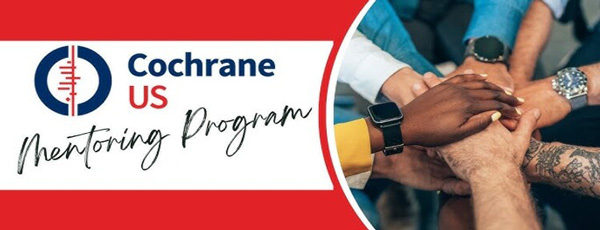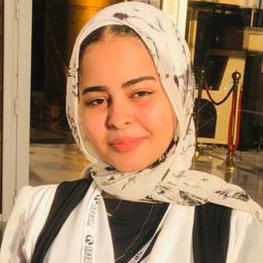Knowledge-sharing through the Cochrane Mentoring program
Authors: Dr Shahd Abdalla1, Yasmine Asaad2, Ana Beatriz Pizarro3
- 1. Aswan University Hospital, Aswan, Egypt
- 2. Department of Public Health and Community Medicine, Faculty of Medicine, Zagazig University, Sharqia, Egypt
- 3. Evidence Production and Methods Directorate, Cochrane Central Executive Team, London, UK
Introduction
When three people from diverse backgrounds and different parts of the world came together under the Cochrane US Health Equity Mentoring Program, none of them realised how much transformation lay ahead. Ana Beatriz Pizarro, a mentor from Colombia, was paired with mentees Shahd Abdalla from Sudan and Yasmine Asaad from Egypt. They are all united by a core belief in equity through evidence-based healthcare (EBHC). The mentoring program was a rewarding and transformative experience for them; they gained new skills in EBHC, learned the power of knowledge-sharing and discovered their potential when someone believes in them.
The program was founded in 2021. It is a 12-month one-on-one mentoring program designed to support students, healthcare providers and early-career professionals from under-represented, under-resourced or discriminated backgrounds to gain the skills and opportunities they need to succeed in health science and evidence-based healthcare.
Why mentorship matters in evidence-based healthcare and the barriers we face
EBHC is key to enhancing healthcare outcomes; however, practitioners struggle to find education and guidance, especially in low- and middle-income countries (LMICs). In such contexts, young professionals often face various barriers and inequities in the evidence synthesis field, such as limited educational resources, interrupted education due to war and fewer opportunities to join global research projects. In particular, these challenges result from limited access to training, scarce opportunities to participate in reviews and, in many contexts, the absence of established evidence synthesis organisations. Without these structures, many early-career professionals struggle with a lack of professional networks, mentorship and research groups in the field, further limiting learning and collaboration opportunities.
This is why mentorship in evidence synthesis is critical. It serves as a powerful platform for knowledge sharing, enabling mentees to gain practical experience, build networks and understand the dynamics of the global community of professionals in evidence synthesis. They gain credibility and recognition by working with esteemed mentors, which dismantles barriers and inequalities. They transfer the knowledge to their peers and institutions, which leads to more impact. Furthermore, the mentor benefits from this relationship by learning how to support juniors.

Cochrane’s commitment to equity through the mentoring program
To make the selection process of mentees more inclusive, the mentoring program developed a screening tool that centred on equity. Rather than relying only on the application form and personal statement, the tool considers the applicant's story and background from an equity viewpoint. This ensures talented applicants from under-represented and limited-resource settings have a real and fair chance of being selected. The Cochrane US Health Equity Mentoring program embodies Cochrane’s value of equity by pairing mentees with mentors who share not only similar research interests but also, where possible, cultural backgrounds and language. Mentors tried their best to provide opportunities and expand the mentees’ experience. Mentees were welcome to engage in different ways, whether it be Cochrane Engage, Cochrane Crowd or even Cochrane groups.
Accomplishments and what we learned together
Looking back, our journey in the mentoring program has given us skills and confidence to get involved in projects that once felt out of reach. Our combined and collaborative efforts gave us the opportunity to try many different things, from conducting reviews, to collaborating in diverse projects with Cochrane thematic groups, to knowledge translation initiatives. We’ve collaborated on a conference abstract and obtained a travel scholarship, written evidence summaries and created community-friendly visual aids to bring evidence to a broader audience. We worked through thousands of article screenings, data extraction, protocols and scoping reviews, often alongside previous year’s mentees, creating a beautiful patchwork of shared learning.
However, more meaningful than achievements is how this experience touched us. The program opened doors to research roles and introduced us to an international community that continues to offer us opportunities to contribute long after the mentorship cycle closes. More importantly, we discovered the power of teamwork.
We found that mentorship is about more than just acquiring skills; it is a way in which we learn to know and show to others that we, too, have something to give as contributing members of the global evidence community. Together, we grow as researchers who create and reshape evidence and share it with our wider community.
Recommendations
We recommend setting up mentoring programs that select participants from diverse backgrounds and encourage knowledge transfer in EBHC across the globe. This can, in turn, encourage locally relevant evidence in the Global South and improve the evidence overall. We also recommend providing capacity-building sessions and practical opportunities for professionals who face barriers in EBHC.
The journey hasn’t ended
It is not over; it is only the beginning. We will continue collaborating with our fellow mentees and mentors beyond the duration of the program. We built lasting friendships and meaningful connections that we will carry forward both professionally and personally. The mentorship gave us skills, a network and confidence and we will now bring what we learned into hospitals and communities. We will lead new projects, teaching other people how to create and use evidence and develop tools that make evidence easier to use. As we continue to grow, we hope to mentor others just as we were mentored, inspired always by our mentor Ana Beatriz Pizarro. We are truly grateful for her support and inspiration throughout this journey.
Quotes
Shahd Abdalla: ‘On this journey, I found the noble purpose I was searching for: to devote my life to serving people through health equity. Seeing my mentor and colleagues who gave everything for this purpose inspired me. That is the true meaning of life.’
Yasmine Assad: ‘The Cochrane US Mentoring program taught me the true meaning of equity. I learned that engaging with people from diverse backgrounds consistently leads to fresh insights, lasting connections and meaningful growth.’
References
- 1. https://us.cochrane.org/news/cochrane-us-mentoring-program-journey-towards-inclusion-and-global-health
- 2. https://engage.cochrane.org/
- 3. https://crowd.cochrane.org/
- 4. https://www.cochrane.org/about-us/who-we-are/our-groups
To link to this article - DOI: https://doi.org/10.70253/MYFR8153
Disclaimer
The views expressed in this World EBHC Day Blog, as well as any errors or omissions, are the sole responsibility of the author and do not represent the views of the World EBHC Day Steering Committee, Official Partners or Sponsors; nor does it imply endorsement by the aforementioned parties.
